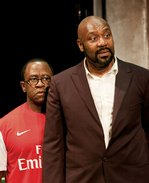SITE GUIDE
SEARCH
REVIEWS
REVIEW ARCHIVES
ADVERTISING AT CURTAINUP
FEATURES
NEWS
Etcetera and
Short Term Listings
LISTINGS
Broadway
Off-Broadway
NYC Restaurants
BOOKS and CDs
OTHER PLACES
Berkshires
London
California
New Jersey
DC
Connecticut
Philadelphia
Elsewhere
QUOTES
TKTS
PLAYWRIGHTS' ALBUMS
LETTERS TO EDITOR
FILM
LINKS
MISCELLANEOUS
Free Updates
Masthead
Writing for Us
A CurtainUp  London Review
London Review
 London Review
London ReviewThe Comedy of Errors
by Tim Macavoy
|
Every why hath a wherefore. — Dromio of Syracuse
|

Lucien Msamati as Dromio of Syracuse and Lenny Henry as Antipholus of Syracuse (Photo: Johan Persson) |
The Duke of Ephesus has banned travellers from Syracuse, so when a merchant named Egeon is found in the city, he faces a 1000 mark fine or death. Egeon explains that he was searching for his son Antipholus, who in turn has come searching for his long lost mother and brother, accompanied by his servant Dromio. Unknown to all of them, the boys from Syracuse have twin counterparts of the same name already in Ephesus. And so begins a trail of mistaken identity as the two sets of twins fall foul of each other's mistakes, leading to debt, betrayal and incarceration.
The Comedy of Errors is a traditional comoedia from the Greco-Roman tradition, and rests on the enjoyment of farce, slapstick and caricature. Director Dominic Cooke wastes no time in getting into the action as Antipholus of Syracuse finds himself embroiled in a cafe food fight the moment he enters the city. Slapstick choreography from fight director Kate Waters uses pool cues, pies, whips, water and knives in a twisting frenzy of fun. The Olivier's rotating stage is put to good use for the climactic chase as both twins are pursued by lovers, police and an army of mental health professionals (including a real ambulance). The towering set of dilapidated town houses gives great dimension to the action as windows light up with delightfully dirty peripheral characters.
Frequent scene changes are slick and the audience is kept entertained by a Greek band performing their own version of popular songs on a theme of madness - Paloma Faith, Cee Lo Green and Dizzee Rascal numbers all feature - although the pumping dance music at interval time clearly divided the audience's appreciation. Other design, including costume, was contemporary without too many glaring modern references, but maybe the coke-sniffing prostitute was a little too much for the bouncy comedy.
Lenny Henry (as Antipholus of Syracuse) is best known for his long comedy career, but met with great acclaim for his portrayal of Othello in 2009 and doesn't disappoint in his return to Shakespeare. He gurns and squeals at every opportunity, taking inspiration from previous stand-up characters that belie his Brummie roots. It's a dangerous game to milk a pause when you're in a fast paced comedy, but he pulls it off with aplomb. The relationship between both sets of master and servant is wonderful - clearly understanding the importance of status play in such a classic text. Daniel Poyser as Dromio of Ephesus and Lucian Msamati as his Syracusian counterpart are so good at playing each other that it is genuinely difficult to tell them apart when they're not speaking in different accents.
Despite the heavy comedic atmosphere, there is some food for thought: what exactly are the madding effects of city life, forever living in a state of temporal emergency? Are our lives so easily replaced by another? And in a capitalist society, where money can get you in trouble and out of it, how do we stop it from deciding our fate? It took until the early 20th century for psychologists to address the strains of metropolitan life, but here at the birth of the city, Shakespeare poses some questions that we still can't answer, in one of his most disregarded plays (it is pretty hard to believe that a story with two sets of twins could be anything more than silly after all).
Cooke has helped the audience negotiate the difficult resolution scene by getting the background actors to give a patronising sigh of "aah" after every sweet moment of reunion - which seems never-ending. But the neat trick here is that by the time we get to the final moments of quiet happiness, it is the audience who fill in the blanks and it becomes genuinely touching, particularly when Dromio (one of them) ends with: "We came into this world like brother and brother; And now let's go hand in hand, not one before another."
|
Subscribe to our FREE email updates with a note from editor Elyse Sommer about additions to the website -- with main page hot links to the latest features posted at our numerous locations. To subscribe,
E-mail: esommer@curtainup.comesommer@curtainup.com
put SUBSCRIBE CURTAINUP EMAIL UPDATE in the subject line and your full name and email address in the body of the message -- if you can spare a minute, tell us how you came to CurtainUp and from what part of the country. |
| The Comedy of Errors
Written by William Shakespeare Directed by Dominic Cooke Starring: Lenny Henry, Chris Jarman, Lucian Msamati, Daniel Poyser, Claudie Blakley, Michelle Terry With: Ian Burfield, Joseph Mydell, Tom Anderson, Jude Owuso, Silas Carson, Amit Shah, Rene Zagger, Adrian Hood, Grace Thurgood, Paul Bentall, Pamela Nomvete, Clare Cathcart Design: Bunny Christie Music: Gary Yershon Sound: Christopher Shutt Lighting: Paule Constable Running time: Two hours 15 minutes with an interval Box Office: 020 7452 3000 Booking to 1st April 2012 Reviewed by Tim Macavoy based on 9th December 2011 performance at The Olivier, National Theatre, Southbank, London SE1 9PX (Rail/Tube: Waterloo) |
|
REVIEW FEEDBACK Highlight one of the responses below and click "copy" or"CTRL+C"
Paste the highlighted text into the subject line (CTRL+ V): Feel free to add detailed comments in the body of the email . . . also the names and emails of any friends to whom you'd like us to forward a copy of this review. |




